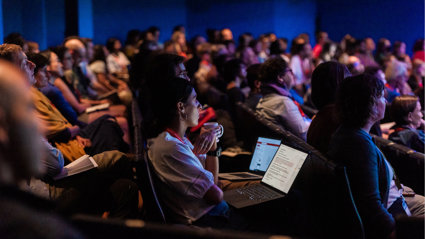
Choosing your conference session format
Conference sessions can be in-person, online, or hybrid (limited availability). They can be structured in a variety of ways, from paper sessions and world cafés to split sessions, digital shorts, and more.
Conference session types
Plenary and journal-sponsored lectures
- In-person and livestreamed to virtual platform.
- Facility to submit questions live using online tool or platform.
- Recorded and uploaded.
Journals and other sponsors wishing to organise livestreamed lectures at the conference should contact ac2026@rgs.org to discuss.
Organised and open sessions
These sessions may include live, online, hybrid, or asynchronous formats.
Live and in-person only
- People in a room
- Not recorded
Live online
- A virtual room
- Accessed through Zoom as the virtual platform
- Live presentations
We are working on options to ensure there are physical spaces on the conference site where those attending in-person can sit to join virtual sessions.
Live hybrid
- Presenters in person and online
- Audience in person and online
- Online attendees and presenters joining via a Zoom virtual session
There is a very limited number of live hybrid slots due to room, kit, and technical support availability. Session organisers wishing to request a hybrid format must bid for this in a competitive process.
Asynchronous content
We recommend session organisers to consider formats that use asynchronous materials as part of live synchronous sessions.
- Upload supplementary content (recorded presentations, PowerPoint slides, PDFs of your paper, posters and more) to the virtual platform.
- Upload recommended reading, questions, or discussion topics in advance.
- Use the asynchronous Q&A to comment on uploaded content or recorded sessions.
- Upload of recorded sessions to watch on catch-up demand.
To make the most of asynchronous content:
- Ask presenters to upload recordings of their presentations and/or papers by a set date.
- Encourage attendees to review materials in advance.
- Use live session time to focus on discussing the presentations and papers.
Organising your session: suggested formats
Our suggested session formats are designed to:
- Encourage a wide range of contributions.
- Promote active involvement of a wide range of people.
- Address the heightened importance of impact and engagement, including the place of research in society.
- Support multiple outputs and follow-up activities (books, journals, publications, blogs, practitioner interventions).
We encourage a wide range of session types at the conference. Session organisers are not limited to our suggested session formats.
If you have an idea for another session format, get in touch with us at ac2026@rgs.org
Paper sessions
Tips for planning a session of conference papers, ranging from keynote presentations to five-minute interactive short papers.
Panel sessions
Sessions of very short talks where presenters pitch ideas, outline a provocation, or briefly summarise current work.
Digital shorts
Series of short talks in which presenters pitch an idea, outline a provocation or summarise their latest work.
Split sessions
Session that combines a more traditional papers session with a second session of an interactive format.
World cafe
Tips for organising a café-style session that encourages sustained discussion and conversation across multiple topics.
Roundtables
Recommendations for a session that engages the audience from the start around a central theme, with expert- or audience-led discussion.
Work in progress
Tips for a session format where participants workshop a work-in-progress in small groups to address a specific question or challenge.
Speed networking
Ideas for a dynamic session where participants discuss a topic in rotating 1:1s before moving to in-depth discussion in smaller groups.
Collaborative sessions
Hints and tips for session organisers interested in working with non-academic contributors.
These guides have been developed by the conference organisers, the Participatory Geographies Research Group (PyGyRG), and the Digital Geographies Research Group (DGRG).








